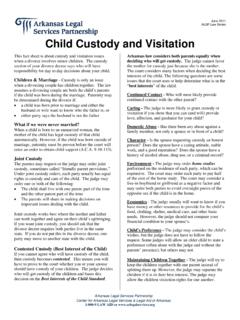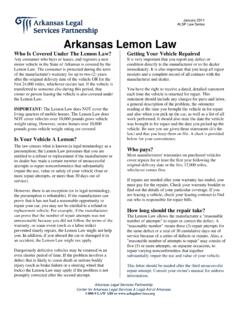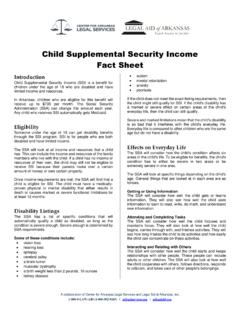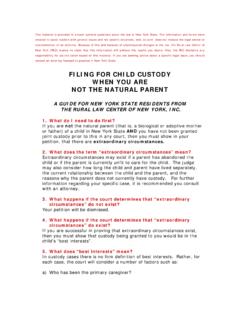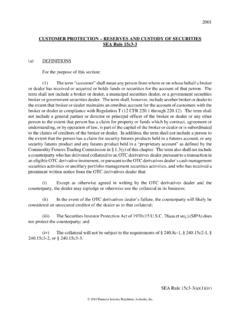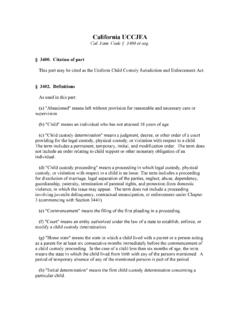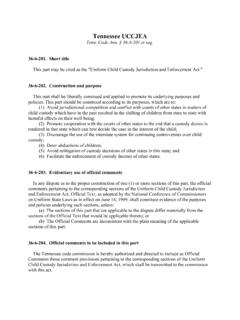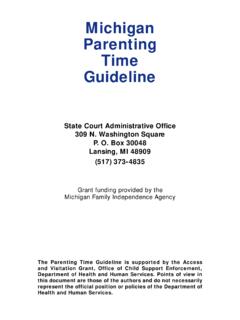Transcription of Child Custody and Visitation - Arkansas Legal Services Online
1 June 2011 ALSP Law Series Arkansas Legal Services Partnership Center for Arkansas Legal Services & Legal Aid of Arkansas Child Custody and Visitation This fact sheet is about Custody and Visitation issues when a divorce involves minor children. The Custody section of your divorce decree says who will have responsibility for day to day decisions about your Child . Children & Marriage - Custody is only an issue when a divorcing couple has children together. The law assumes a divorcing couple are both the Child s parents if the Child was born during the marriage. Paternity may be determined during the divorce if: a Child was born prior to marriage and either the husband or wife want to know who the father is; or either party says the husband is not the father What if we were never married? When a Child is born to an unmarried woman, the mother of the Child has Legal Custody of that Child automatically.
2 However, if the Child was born outside of marriage, paternity must be proven before the court will enter an order to obtain Child support ( 9-10-113). Joint Custody The parents may request or the judge may order joint Custody , sometimes called friendly parent provisions. Under joint Custody orders, each party usually has equal rights to Custody and care of the Child . The judge may order one or both of the following: The Child shall live with one parent part of the time and the other parent part of the time The parents will share in making decisions on important issues dealing with the Child . Joint Custody works best where the mother and father can work together and agree on their Child s upbringing. If you want joint Custody , you should ask that the divorce decree requires both parties live in the same state. If you do not put this in the divorce decree, one party may move to another state with the Child .
3 Contested Custody (Best Interest of the Child ) If you cannot agree who will have Custody of the Child , then Custody becomes contested. This means you will have to prove to the court whether you or your spouse should have Custody of your children. The judge decides who will get Custody of the children and bases this decision on the Best Interests of the Child Standard. Arkansas law considers both parents equally when deciding who will get Custody . The judge cannot favor the mother for Custody just because she is the mother. The court considers many factors when deciding the best interests of the Child . The following questions are some issues that the court uses to help determine what is in the best interests of the Child . Continued Contact - Who will most likely provide continued contact with the other parent? Caring - The judge is more likely to grant Custody or Visitation if you show that you can (and will) provide love, affection, and guidance for your Child ?
4 Domestic Abuse - Has there been any abuse against a family member, not only a spouse or in front of a Child ? Character - Is the spouse requesting Custody an honest person? Does the spouse have a caring attitude, stable work, and a good reputation? Does the spouse have a history of alcohol abuse, drug use, or a criminal record? Environment - The judge may order home studies performed on the residence of each party, which can be expensive. The court may order each party to pay half of the cost of the home study. The court may consider a live-in boyfriend or girlfriend as a negative factor and may order both parties to avoid overnight guests of the opposite sex if the Child is in the home. Economics - The judge usually will want to know if you have money or other resources to provide for the Child s food, clothing, shelter, medical care, and other basic needs. However, the judge should not compare your financial condition to your spouse s.
5 Child s Preference - The judge may consider the Child s wishes, but the judge does not have to follow the request. Some judges will allow an older Child to state a preference (often alone with the judge and without the parents presence), but others may not. Maintaining Children Together - The judge will try to keep the children together with one parent instead of splitting them up. However, the judge may separate the children if it is in their best interest. The judge may allow the children Visitation rights for one another. 1-800-9 LAW AID or June 2011 ALSP Law Series Arkansas Legal Services Partnership Center for Arkansas Legal Services & Legal Aid of Arkansas Attorney Ad Litem In some cases, the judge may appoint an attorney ad litem to represent the Child s best interests. The attorney will try to find what is in the best interests of the Child . The attorney may talk to the parents, children and other people (such as teachers or doctors).
6 The attorney ad litem makes a recommendation to the court on who should get Custody based on the information gathered. Mediation and Parenting Classes The judge may make the parents take parenting classes and/or submit to mediation to talk about parenting, Custody , and Visitation issues. Custody by a Third Person The judge usually gives Custody to a parent unless the parent incompetent or unfit. If the parent is incompetent or unfit, then the judge may give Custody to another person, like a grandparent or other relative. The judge will decide based on what is best for the Child . Visitation If the parents can work together, then the court may grant what is called liberal Visitation . This means that it is up to the parents to work together to decide when, where, and how long the Visitation takes place. If you can show that you will cooperate with the parent who has Custody , then you are more likely to get Visitation rights.
7 The judge is more likely to give Visitation rights if the Child will suffer if he or she cannot see you. A noncustodial parent with Visitation rights has the right to see his or her Child s school grades. If the parents cannot work together, then you should include a Visitation schedule in the final Custody and Visitation court order. Some judges have Visitation guidelines that they follow. A standard Visitation schedule might include Visitation every other weekend, switching holidays and an extended period of time during the summer for school age children. If a specific Visitation schedule is in the court s order, the start date for the Visitation will be in the order, too. This helps the police in figuring out whether or not a noncustodial parent is supposed to have Visitation . Visitation may be restricted when it is in the best interests of the Child , such as supervised Visitation .
8 This means that the noncustodial parent can visit with the Child but only under certain circumstances, such as being in the presence of another adult ( , a relative), or that the Visitation can only happen in a certain place, or both. Visitation and Child Support Visitation and Child support do not depend on each other. The noncustodial parent must still pay Child support. If the noncustodial parent is not getting Visitation , he or she cannot withhold Child support payments. If a custodial parent is not receiving Child support, he or she cannot deny Visitation . Enforcing an Existing Order If one party is not doing what he or she is supposed to do under the divorce order, the other party can petition the court by filing a motion for contempt. The party who petitions the court must prove that the other parent did not follow the Custody or Visitation rules in the divorce order.
9 The party that files the petition asks the court to find the offending party in contempt of court. If the judge agrees that the other party is in contempt, the judge has many ways to make the party obey. Modifying Custody To get an order changed, the party asking for the change must prove a material change in circumstances since the date of the original decree. A petition must be filed to reopen the case and set a hearing date. There is a $50 fee to re-open a case. Modifications when Parties Move The county where the divorce took place will keep jurisdiction to change the divorce decree as long as at least one of the parents still lives in the state, even if the custodial parent moves to another state. If both parents move to another state, then different courts have jurisdiction. The ALSP Law Series is produced by the Arkansas Legal Services Partnership, a collaboration of the Center for Arkansas Legal Services and Legal Aid of Arkansas , Inc.
10 These nonprofit organizations provide free Legal Services to eligible Arkansans who meet income, asset and other guidelines. Legal Services may include advice and counsel, brief Services , or full representation depending on the situation. Additional information can be found at: http\\ To apply for Services , call 1-800-9 LAW AID. The information and statements of law in this fact sheet should not be considered Legal advice. This fact sheet is provided as a broad guide to help you understand how certain Legal matters are handled in general. Courts may interpret the law differently. Before you take action, talk to an attorney and follow his or her advice. Always do what the court tells you to do. Visit for more information 1-800-9 LAW AID or
